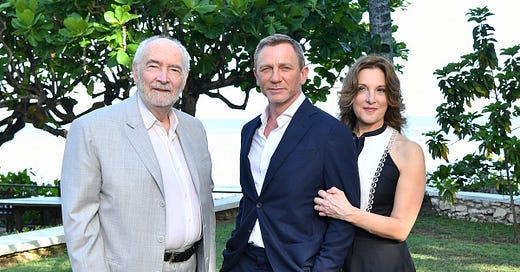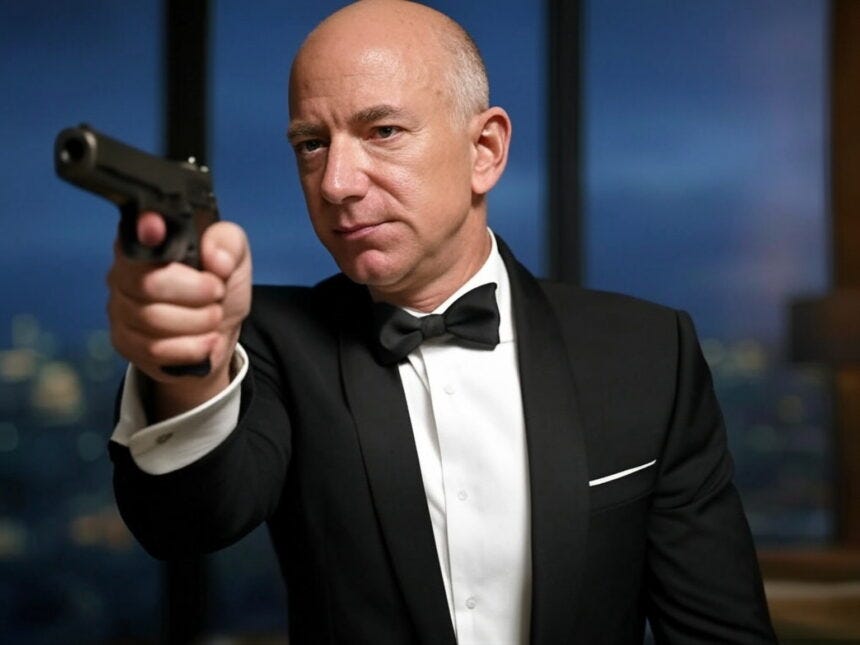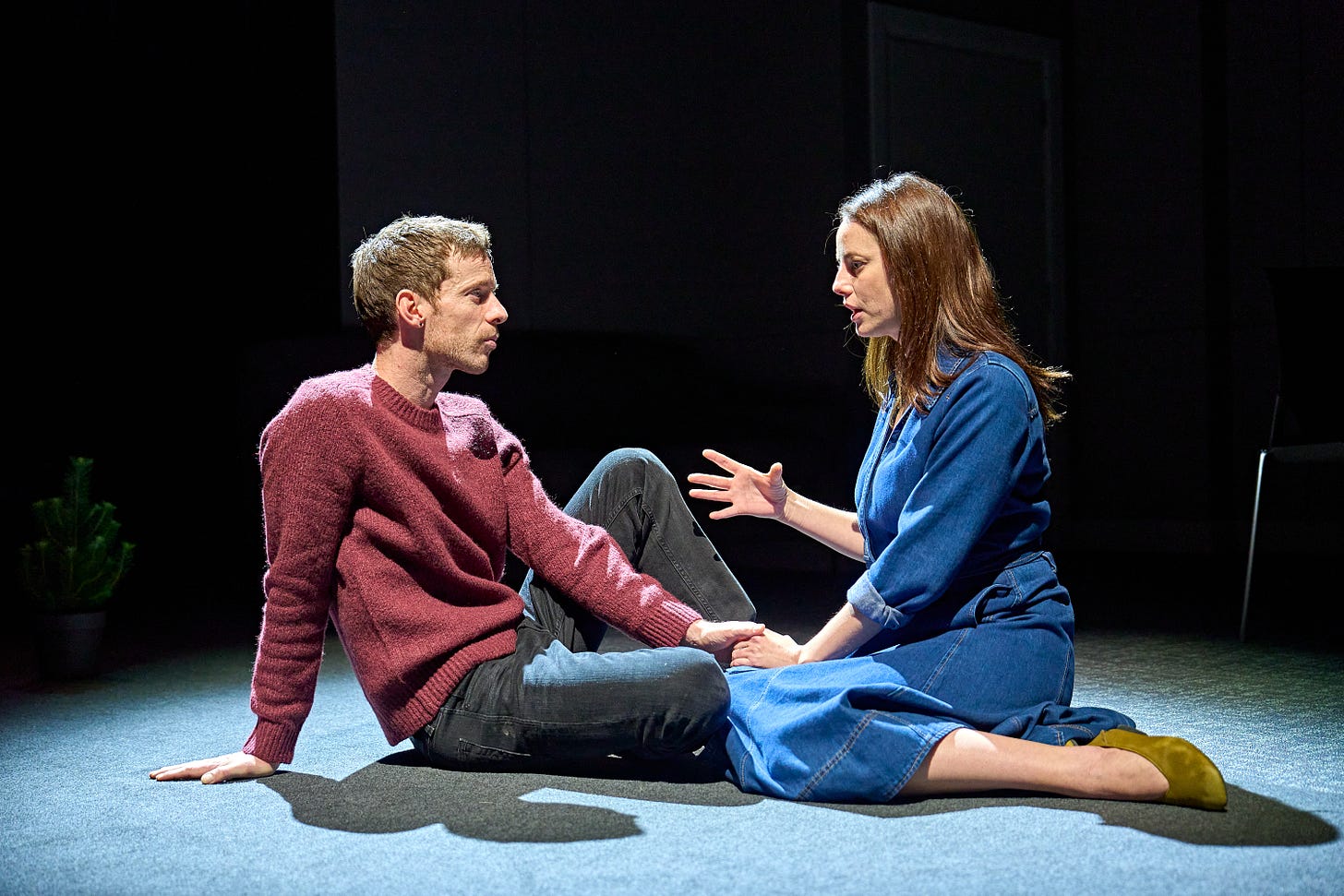New Bond Girl? Meet Alexa
In this edition:
Reviews of East is South and The Lonely Londoners
To Book: A new Hamlet and The Fifth Step
Also: Bond, The White Lotus & taxing the tourists
Bond in the Amazonian Jungle
I met Barbara Broccoli last year at a drinks reception, where she stood alongside top Amazon MGM Studios executives. The event celebrated young voices in cinema, but whispers had already begun—Broccoli, the longtime steward of James Bond, was uneasy about the studio’s vision for 007’s future. She disliked how the franchise, once a cinematic institution, was being reduced to mere “content.”
Even then, discussions had begun—serious talks about the siblings stepping back from creative control over what is arguably the last great untapped mega-brand. Bond, alongside Marvel, DC, and Star Wars, remains one of the few franchises yet to be fully mined for spinoffs, TV series, and an interconnected universe. After a year of negotiations, Amazon is now set to take full control of the 60-year-old franchise, which has produced 25 films centred on the world’s most famous spy. Regulatory approval in the U.S. and U.K. is expected later this year.
At the centre of this shift is Jeff Bezos, who personally shaped the deal ensuring Broccoli and her half-brother, Michael Wilson, retain a financial stake while stepping back from creative leadership. For years, the two resisted expansion, wary of the franchise losing its prestige through overexposure. Insiders say they didn’t always agree, but their caution may have been well-placed. Marvel and Star Wars, once unstoppable, now face diminishing returns, their relentless output dulling their impact. Now, Bond stands at a crossroads. Whether he remains a rare cinematic event or becomes a sprawling franchise under Amazon’s control remains to be seen.
As quoted in Variety:
“If you own a Ferrari but don’t control where or if it goes, it’s frustrating,” says former Amazon Studios chief Roy Price. “The Broccolis have provided the best example in Hollywood history of managing a character. But in today’s complex landscape, it makes sense for Amazon to get in the driver’s seat and control their own destiny.”
Further speculation about the future ‘woke Bond’ is rife - he was, after all, created in the height of the Cold War, long before gender equality and alcohol free spirits were parroted around studios.
“There’s something so special and unique about Bond, and you can’t just strip him of the things that make him so debonair and cram five projects into production right now and not totally destroy everything about the property,” says Peter Newman, head of the MBA/MFA graduate dual degree program at NYU’s Tisch School of the Arts. “And if you make Bond more politically correct, you’re going to have a lot of pushback.”
The issue I have with Amazon is their lack of quality content. The studio gambled on a pricey The Lord of the Rings: The Rings of Power series that was fairly dreadful for one of the most coveted pieces of intellectual property in Hollywood. And even Amazon — one of the most well-capitalized corporations in the world — can’t afford another spy show like Citadel, which is considered one of the most expensive TV series ever made, with Series 1’s six episodes costing $300 million. Amazon will now look to get more bang for its buck when it comes to Bond than Eon could ever manage, meaning that we’re likely to see the iconic MI6 agent return in multiple content formats from now on: TV spinoffs, podcasts, AI experiences - you name it.
Hunting for Cultural Cash
I found this piece in the FT (by Tristram Hunt) really interesting about how to fund our cultural institutions from tourism without adding a barrier to entry:
… the question surfaces (and I have myself asked it): why are the permanent collections of UK national museums — such as the V&A, the British Museum and Tate — free for foreign tourists when from the Mauritshuis to the Metropolitan Museum of Art, an entrance fee (sometimes for both domestic and foreign audiences) is the norm. Surely the futility of Brexit — which with the addition of the upcoming e-visa charge is now piling on yet another travel cost — liberates us to set our own ticketing system for global visitors?
We certainly need the cash. Across all major areas of support, public investment in the arts in England and Wales fell by 21 per cent from 2009/10 to 2020/21. When it comes to the state of our ageing museums and galleries, energy systems, permanent display rooms and conservation studios, comparison with colleagues in Europe, the US and Middle East is beginning to grate. Yes, we raise lots in private philanthropy, but a lead gift for sorting out the sewers is often harder to land than sponsorship of a high-profile exhibition.Instead, let’s finally get on with it and introduce a tourist charge on overseas visitors at hotels and overnight tourist accommodation, but with the funds ringfenced for cultural infrastructure.
It does sound tricky to enact in practice however - but something needs to be done for London’s museums, theatres and galleries. The outgoing interim director of the British Museum, Mark Jones, has called for Britain’s national institutions to be allowed to charge overseas tourists for admission to their permanent collections. Relying upon corporates greenwashing and legacy donors in the long run comes with its own challenges (and protests).
What To Watch
The White Lotus
Mike White’s masterly series takes a new gang of shiny unhappy people to a Thai resort.
Toxic Town
Toxic Town, external depicts the real-life battle of families in Corby whose children were born with defects in one of the UK's biggest environmental scandals. Gripping and upsetting, it is hats off to Jack Thorne - very un-Netflix in subject matter which is probably why it’s so good…
To Book
Chichester Festival theatre announces first Hamlet, starring Giles Terera
Justin Audibert is now preparing to direct Hamlet himself, with the tragic prince played by Giles Terera, who won an Olivier award when he starred as Aaron Burr in the London premiere of Hamilton. The play will open in September in Chichester’s smaller Minerva theatre. “We are imagining that Old Hamlet [the prince’s father] has let the kingdom decline,” says Audibert, whose production will explore the “leadership vacuum” that comes from an older generation “clinging on to power for a really long time”. Hamlet’s father “has definitely got some Biden vibes” says Audibert, and the director has also been reflecting on the succession of Syria’s Bashar al-Assad from his father, Hafez. Terera, who starred as Othello at the National Theatre in 2022, will play a Hamlet who is similar in age to his stepfather, Claudius.
The Fifth Step
Slow Horses star Jack Lowden is to reprise his role in The Fifth Step, a play about addiction, faith and masculinity, in a new West End production co-starring Martin Freeman Lowden first appeared in the drama, written by David Ireland, at the Edinburgh International Festival last year and drew acclaim from me for his performance as an alcoholic, Luka, in recovery. The two-hander starred Sean Gilder as Luka’s older mentor, a part that will be played by Freeman in the production at @sohoplace in London, running from 10 May until 26 July. Finn den Hertog will again direct.
Reflections
The Lonely Londoners at The Kiln Theatre
Roy Williams cements his reputation as an unflinching chronicler of Britain’s complicated and often brutal relationship with race and identity. From Selvon’s picaresque novel, he crafts a narrative that lays bare the Black immigrant experience, capturing both the ambition and disillusionment of those seeking a new life in an unwelcoming land. Bamgboye’s direction strips away period drama conventions, making the story feel as urgent now as in the 1950s. The men’s struggles—economic hardship, racism, and fractured masculinity—are explored in depth, with Simpson’s Galahad unraveling from swagger to despair, Kyem Jnr’s Big City balancing humour and quiet sorrow, and Israel’s Moses shifting from paternal wisdom to raw regret.
Yet, for all its strengths, the production falls short in its portrayal of women. While the men are given space for complexity, the female characters remain largely defined by their relationships to them—Agnes (Shannon Hayes) as the battered wife, Tanty (Carol Moses) as the feisty matriarch, and Christina (Aimée Powell) as the lost love from Trinidad. Their presence, often as silent witnesses onstage, adds a layer of commentary, but their inner lives remain largely unexplored. Even as Agnes endures Lewis’s unchecked rage, we glimpse her suffering but not her full humanity. In a play that so powerfully excavates Black male identity, the women feel like an afterthought, their roles limited in a way that undercuts the richness of the world Williams and Bamgboye seek to build.
East Is South at The Hampstead
Beau Willimon’s new drama is a dense, unwieldy fusion of police procedural and philosophical inquiry, so laden with weighty debates that it nearly collapses under its own intellectual heft. Discussions on AI, consciousness, divinity, and paradox swirl relentlessly, punctuated by name-drops of Plato and Nietzsche. The sheer volume of sub-themes—some profound, others pretentious—makes coherence elusive, despite the best efforts of a strong cast. The play wants to engage with AI’s moral and theological implications, but instead drowns in academic posturing.
The human drama, meant to ground the lofty ideas, is disappointingly inert. Lena and Sasha’s romance has no spark, their chemistry as lifeless as the AI they fear. The interrogation scenes lack urgency, failing to convey the existential terror that should underpin a story about an ungoverned super-intelligence. Cliff Curtis’s Ari Abrams exists primarily to dispense aphorisms, while geopolitical references to Russian hacking feel like window dressing. Faith and resignation in the face of destruction may be the play’s core themes, but they are buried under a script so overwritten it might have been more compellingly generated by AI itself.












